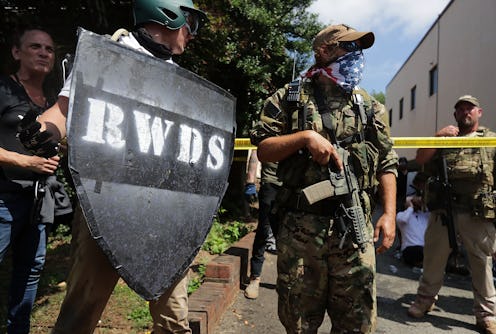News
The ACLU Fought For White Supremacists' Right To Protest. After Charlottesville, It's Learned Its Lesson.

The American Civil Liberties Union, one of the oldest and most powerful organizations dedicated to the legal defense of civil rights, has amended its policy in the wake of the violence in Charlottesville. While they will still defend hateful speech, the ACLU won't defend protestors who agitate with weapons.
The civil rights organization has long been controversial in its stance extending its defense of those rights even to distasteful figures. The group famously defended the rights of Nazis to march in Skokie, Illinois, a town populated by many Holocaust survivors, in 1978, setting a precedent for the government's protection of speech, even hate speech. But it seemed that the rally in Charlottesville — which the ACLU fought on behalf of the white supremacists for — was a step too far.
“If a protest group insists, ‘No, we want to be able to carry loaded firearms,’ well, we don’t have to represent them," ACLU executive director Anthony Romero told the Wall Street Journal. "They can find someone else.”
According to a joint statement from three ACLU branches in California, which initially announced the new policy: "If white supremacists march into our towns armed to the teeth and with the intent to harm people, they are not engaging in activity protected by the United States Constitution. The First Amendment should never be used as a shield or sword to justify violence.”
The announcement comes after the group took flak for successfully suing Charlottesville on behalf of the white supremacist rally organizer. Some felt that the ACLU, in promising to do so, was allowing the rally-goers to act without impunity, leading to the situation escalating to violence. (One counter-protestor, Heather Heyer, died after being rammed into by a car.)
After the violence in Charlottesville, Waldo Jaquith, a member of the board of the ACLU's of Virginia announced that he was resigning from the organization out of opposition to them defending Charlottesville protesters.
The differentiation the ACLU seems to be making in its decision over which speech is worthy of defense seems to follow free speech doctrine on "incitement" or "fighting words." According to the Supreme Court ruling on Brandenburg v. Ohio in 1968, speech can be blocked if it is "directed at inciting or producing imminent lawless action." Some legal scholars had made the argument that by bringing guns to the Charlottesville rally with the intention of intimidation and the expectation that the rally could become violent, their actions went beyond free speech.
Romero says that the new policy is “neither a blanket no or a blanket yes,” meaning that the ACLU, which frequently does defend gun rights under the second amendment, could defend some armed protesters on a case-by-case basis, if the group felt that the protesters had not sought to incite violence. But the policy change from the group is a sign that, even for a group that has proudly defended the rights of Nazis before, the events in Charlottesville were a step into something darker.